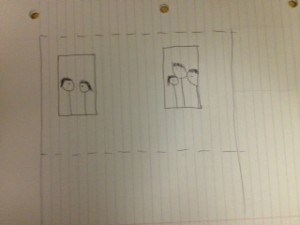When I checked out this film’s profile online, multiple reviewers classified it as a Western of sorts. Initially after watching Aferim!, the connection seemed to me a bit loose, or at least unintuitive. Sure, there’s lawmen on horseback and confrontations with a nation’s violent and ugly past, but the genre comparison still didn’t fit well, at least emotionally. Maybe the forests and plains of Walachia just can’t substitute for the dusty expanses of Monument Valley.
However, after a bit more thought, one scene started to give off the Western vibe, or at least a kind of sentiment that I’ve come to associate with the Western genre. At the end of the film, a constable by the name of Constandin rides into the distance besides his son Ionita. The two men discuss the heinous act of violence that was committed right before their eyes moments ago, and Constandin muses that this is just the way of the world. Sure, he wanted things to go about more justly, but what are you gonna do? Walachia is antiziganist and practices slavery. What can I do about it? Nothing, so toodle-oo! Instead of giving the audience justice, Aferim! delivers a portrait of complacency, perhaps to remind viewers that no norm is permanent. People dismissed cruelty back then, so think again before you make light of the problems of the present.
Compre this to The Searchers, a 1956 film in which John Wayne plays a deeply racist ex-Confederate solider, Ethan Edwards. The film allows Ethan revenge on the Comanche chief who killed his brother’s family, but it does not celebrate him and depicts his vengeful zealotry as grotesque and unhealthy. Tellingly, The Searchers ends with Ethan leaving a cabin as the doors shut behind him; the film seems to say, “Thanks for your help, but you’re not wanted anymore“.
And then there’s 1973’s Pat Garrett and Billy the Kid, which, as the tile suggests, tells the story of Billy the Kid’s last days as he is hunted by his ex-friend-turned-reluctant-lawman Pat Garrett. Unlike most cat-and-mouse stories, this film is bereft of tension. History dictates that Garrett shoot Billy; the audience knows what’s going to happen. So instead, director Sam Peckinpah weaves together a series of vignettes that depict the Old West as a blood-soaked frontier in which no one wants to kill each other, but they have to because they’re on opposite sides of the law. This law, by the way, is also shown to be little more than a way for wealthy ranch owners to rub out those whose deeds threaten their business operations. When Garrett finally shoot Billy dead, he fires another bullet at his own reflection before riding alone into the night, a stray child tossing pebbles at his horse, condemning him for selling-out.
Aferim!, The Searchers, and Pat Garrett and Billy the Kid are three very different films, but at their core, all are stories of inglorious ancestors. Constandin let horrific acts go unpunished. Ethan Edwards surrendered most of his life to hated. Pat Garrett sold out to the money men. Each carries burdens of different weights and have committed sins of various degrees of severity, but none will receive a romantic ride into the sunset.

